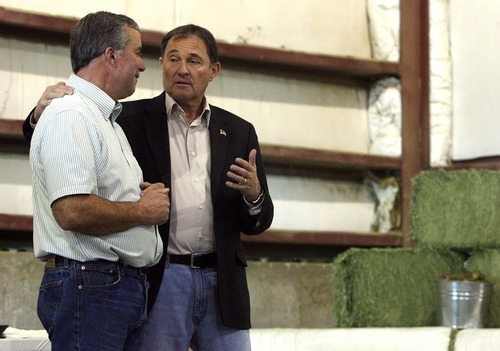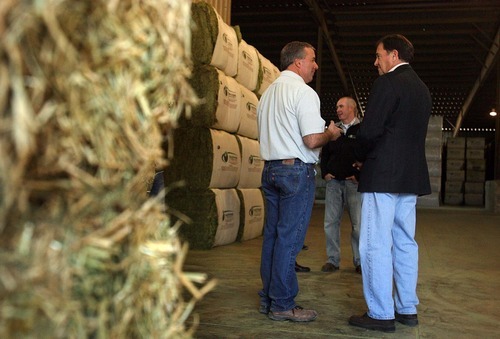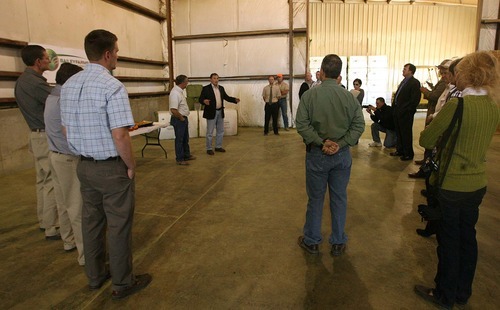This is an archived article that was published on sltrib.com in 2011, and information in the article may be outdated. It is provided only for personal research purposes and may not be reprinted.
Fairview • Byron Davis wanted to know what the state could do to help rural communities off the beaten track.
Davis, mayor of Wales in Sanpete County, told Gov. Gary Herbert Thursday that his community needs help as it tries to make "something out of nothing."
In another stop on the governor's tour of rural Utah, farmer and businessman Tom Bailey of Ephraim informed Herbert that all some outlying areas need is a little more infrastructure to make a go of things.
He's co-owner of Bailey Farms International, which ships alfalfa to dairies in China, Japan, Korea and Taiwan. The company grows its own alfalfa and buys from more than 560 farmers. It employs 60 people and has average annual sales of $45 million. Bailey told the governor that his company hopes to increase production in the Vernon area, but roads and power are needed.
Both Davis and Bailey said rural areas need the attention of state government, not its constrictions.
"I kind of feel like we are the stepchild of the whole system," Davis told Herbert during a luncheon in Fairview. "We have no infrastructure and we're trying to run a town with nothing to bring into it, and [yet] we're placed under the same guidelines and restrictions by government" that larger communities are.
Herbert, who is on the third day of what is billed as rural jobs tour, said the solution is to keep government's role as small as possible, and let free market economics bring prosperity to Utah's most remote communities.
"We need to know where we can help you be the very best you can be," Herbert said. Government, he added, should limit its role to providing things such as roads and water, along with creating a climate that allows business to thrive.
Spencer Cox, a Sanpete County commissioner and vice president of CentraCom Interactive, agreed.
He said the 108-year-old telecommunications company, which operates a fiber-optic network that runs from Richfield to Salt Lake City and on to Wendover, Nev., has thrived while the government-backed iProvo and UTOPIA networks have hit financial problems.
Part of the reason, Cox believes, is that access to public money fosters inefficiency, while a private company has to live within its means and be more efficient. UTOPIA and iProvo "are a burden on taxpayers and the public."
He said Centracom has worked in partnership with the government, mainly swapping conduit space with the Utah Department of Transportation.
Herbert stressed that there is not a single solution to rural communities' issues. He said the key is tailoring economic development to individual needs. "We all need to find our niche in the local marketplace."
Herbert said the purpose of his tour is to learn what rural Utahns need to foster economic development. He said the state needs a healthy rural Utah to survive. In Ephraim, he emphasized that agriculture is a top priority.
Bailey tried to let him know just how important the industry is. "Manufacturing and commercial development is important to rural Utah," he said. "But we (the farmers) have the land, and agriculture will always be key."
Alfalfa is Utah's No. 1 cash crop. Prices last year were $90 to $110 per ton. The price has gone up to $200 to $210 per ton because of demand from international markets and the extreme drought in Texas and New Mexico, said Utah Commissioner of Agriculture Leonard Blackham, who accompanied the governor on the tour.
Utah is known for its high-quality alfalfa, which in some parts of Ephraim has a protein content as high as 25 percent.
"Washington state is known for its apples and Florida is known for its orange juice," said Agriculture Department spokesman Larry Lewis. "Utah is famous for its alfalfa crop."
Herbert said problems facing rural Utah are unique, and one-size-fits-all edicts mandated out of Salt Lake City won't work. Problems farmers face in northwestern Utah are different than those facing farmers in the southeastern part of the state.
Herbert also stopped at Barnes Bullets, which relocated to Mona from Lindon two years ago. Jessica Brooks, Barnes public relations manager, had one piece of advice for the governor.
"We need you to stay pro-gun," Barnes said.
Herbert said he is pro-Second Amendment and is consistently endorsed by the National Rifle Association.







